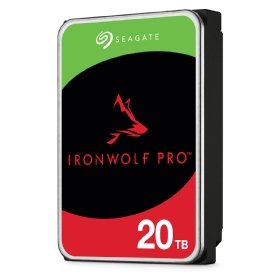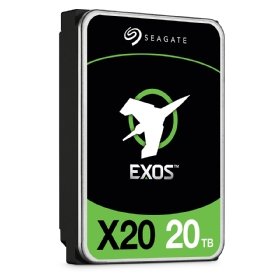
Getty Images/iStockphoto
Seagate's 20 TB hard drives ship
Seagate has pumped its max-capacity hard drive up to 20 TB, with a version for the enterprise, Exos X20, and another for SMBs, IronWolf Pro 20 TB.
Seagate launched and is shipping 20 TB HDDs in both its enterprise Exos series and its network-attached storage IronWolf Pro series.
The new hard drives use conventional magnetic recording (CMR) as opposed to shingled magnetic recording (SMR), which can up the density of the HDDs. In terms of hardware, the drives are similar, both being helium-sealed drives with 10 disks -- a company first, according to Seagate. The Exos X20 is designed for enterprise use, and the IronWolf Pro series is aimed at NAS and SMBs, which try to address the need for growing capacity.

Data is being generated at an enormous rate, said Sinan Sahin, a principal product manager at Seagate, and society is on pace to generate about 35 zettabytes of data this year. Depending on the model, the rate of data generation could increase four times over in the next four years.
"We feel like 20 TB [drives] are going to be an important part of the offering in our portfolio, as there will always be a need for the highest capacity," he said.
Customers and vendors are looking for higher capacity points, echoed Ed Burns, research director of HDD and storage technologies at IDC. Customers tend to think in terms of total capacity and total cost of ownership; for example, five 20 TB HDDs take up as much rack space as twice as many hard drives at half the storage. Vendors want to address customer needs while experiencing higher profit margins by providing greater storage capacity using the same bill of materials, he said.
"There is a huge appetite for more petabytes," Burns said. "Cloud service providers partner with HDD vendors and work closely with them in the development of new technology, such as adding another disk to get the capacity up to 20 TB."
Similar design, different firmware
Seagate is answering the call for more capacity with the new Exos and IronWolf. Both 20 TB drives have the same base design, Sahin said. Both use 10 disks and are designed for 24/7 operations. The Z height was unaffected by the addition of another disk, meaning the drives can act as a drop-in replacement.
The products differ, however, in the firmware, Sahin said. Exos drives have been tuned for enterprise use cases, specifically in the cloud and data center usage, and IronWolf drives are tuned for NAS use cases. For example, Sahin said, a timeout on a command for a NAS may differ compared with a cloud. In terms of accessibility to the data, users can have a slight delay in a larger data center compared with a NAS.

The Seagate Exos X20 is the enterprise version aimed at high-capacity cloud storage with up to 285 MBps for performance, Sahin said. According to a press release, the Exos X20 delivers 4.16 ms for latency and has 3.5 million hours for mean time between failure.
How the drives are used will affect performance, Sahin said. If the drives are added to a rack of 100 drives, they can boost the performance of reading and writing from multiple drives, making it a better option for data center and cloud applications.
The IronWolf Pro 20 TB is aimed at SMB NAS usage. However, the new HDD has rotational vibration sensors that minimize issues from system vibration and supports up to 24 bays in a single device, making it attractive for larger enterprise NAS applications as well, Sahin said. The IronWolf has the same quoted performance of 285 MBps, and according to the material provided, the drive has user workload rate limits of 300 TB per year.
Drawbacks and pricing
The 20 TB HDDs somewhat quell the appetite for capacity, but they can take longer to qualify, according to Burns. Larger-capacity drives will take longer to test, which in turn means that ramping up production will be slowed down as well.
Sahin said Seagate has shipped about 8,000 units, an indicator that the company has already ramped up the product.
Seagate intends to increase shipping the new drives this month with the Exos X20 20 TB going for $669.99 per HDD and the IronWolf Pro 20 TB being priced at $649.99 per HDD, the latter coming with a five-year limited warranty.
Although also a 20 TB HDD, the Western Digital technology announced in August is different from Seagate's news, IDC's Burns said.
WD supplies a nine-disk, 20 TB HDD that uses its OptiNAND technology as well as energy-assisted perpendicular magnetic recording (ePMR), an interim step between CMR and its microwave-assisted magnetic recording (MAMR) technology. EPMR uses energy-assist technology to increase areal density of nine disks to 20 TB, he said.
Seagate, on the other hand, added another disk and continued to use CMR technology to get to 20 TB.







